- Home
- David Gemmell
White Knight/Black Swan Page 7
White Knight/Black Swan Read online
Page 7
‘I am sorry if I embarrassed you, Bimbo. I hope we meet again.’
Bimbo left the flat and found Esther sitting quietly on the stairs, a bottle of wine beside her. Bimbo squeezed alongside her.
‘Go back in, sweetheart.’
‘Do you like him, Bimbo?’
‘He’s ace.’
‘Really?’
‘Yeah. Hook ’im and land ’im.’
She giggled and kissed his cheek. ‘And, princess …’
‘Yes, Bimbo?’
‘Stop tellin’ him about me, and start talkin’ about ’im. All right?’
Stepney gazed at the chessboard and shook his head. ‘Not a wise move, Bimbo. You have just eaten the Poison Pawn. Now your Queen is doomed, for I can pursue her with Knight and Bishop and she will fall.’
‘Poison Pawn. I don’t understand.’
‘It is like a sacrifice. The little pawn stands alone, unprotected, begging the Queen to eat her. When the Queen does so she has signed her own death warrant.’
‘You do put a lotta colour in the game, Step.’
‘It is a great game, but it is a game of death. Checkmate is a bastardisation of the Persian Shah Mat – the king is dead. Let us stop for a while. My brain is tired.’
‘Balls! You’re just feelin’ sorry for me.’
‘That too. Some tea?’
‘Why not?’ Bimbo glanced at the clock on the mantelshelf. It was almost midnight. ‘Don’ half make time fly, playin’ chess.’
‘Yes,’ agreed Stepney, returning with a teapot and two mugs on a silver tray.
‘Where’d you learn to play?’
‘In Russia. It is the spiritual home of the game these days.’
‘I didn’t know you’d bin to Russia.’
‘There is much you do not know, my friend. I was taught by a cossack. Fine man, great horseman. The game helped overcome my fears.’
‘Fears of what?’
‘Of being killed, or captured, or maimed.’
‘You talkin’ about the war?’
‘Of course. Why else would a civilised man want to cross Russia?’
‘Was you with the Russian army?’
Stepney chuckled, and poured the tea. ‘I was with the Totenkopf Regiment – Deathshead. We were an SS Panzer group.’
‘Germans? I thought you was a Jew,’ said Bimbo, surprised.
‘One of life’s ironies, my friend. God’s little joke. I am a German, from a good Aryan family. But I was telling you of the war. We were the pride of the German army. Unbeatable. We crushed all resistance and swept across the Soviet army like elephants across a field of ants. Great tank, the Tiger. On firm, flat ground there was no machine on earth to match it. But – with the diesel fuel frozen solid it was just another metal monster, immobile and useless.’
‘I seen a film once about the war. Winter done ya,’ said Bimbo.
‘That and a costly mistake. We misread the people. When we invaded we were met by cheering crowds. They hated Stalin. They looked on us as deliverers. We could have had an enormous army of cossacks riding with us. But our leaders believed in the principles of rule by terror. Jews were rounded up and slaughtered. Russian peasants were herded into slave labour camps. We proved worse than the Bolsheviks and the people turned against us. Stalingrad was a nightmare beyond description. But some of us broke out and limped home. Home? Ruins and ashes.’ The old man fell silent.
‘Long time ago, Step.’
‘I give you some advice, Bimbo. You take it.’
‘Sure.’
‘Never do anything your heart is against. Verstehen?’
Bimbo gazed at the old man, saw the intensity in his eyes and then nodded. ‘Sure,’ he said.
Stepney shook his head. ‘No! This is not some idle theory, and I do not wish you to patronise me. What I am telling you is about life. It is so easy to compromise, to tell yourself it does not matter. Or someone else will do it if you don’t. It always matters. The world can crush us and kill us, but the most terrifying injuries are always from within. Our own deeds. They can torment us with whips of fire. Once I did a terrible thing …’
The old man fell silent, then licked his thin lips.
‘You don’t have to tell me. I don’t need to know,’ said Bimbo, swiftly.
‘Confession is good for the soul, nicht war?’ But Stepney said nothing more, and sat silently, staring down at the chessboard.
‘It’s gettin’ late, Step,’ said Bimbo, rising. ‘I’ll see you Monday.’
‘You are a good boy, Bimbo. Follow the heart, eh?’
‘Yeah. Look after yourself.’
The Reverend Richard Kilbey opened the vestry door about three inches and peeped out at the congregation. Almost a hundred people had gathered for Morning Communion and he allowed himself a fleeting moment of pride. When he had first come to this West London parish three years ago the first congregation had numbered twelve. A towering figure at the back caught his eye. The vicar shut the door and smiled.
‘Good congregation today,’ he told Evans, his sidesman and leading baritone.
The organ sounded and Richard stepped back to allow the choir to precede him as they filed into the old church, and along both sides of the aisle to the choir stalls. Richard knelt before the podium and tried to pray. But Bimbo’s face intruded on his communion with the Creator.
‘Forgive me, Lord,’ he whispered, ‘but I cannot concentrate.’ Every Sunday for a year Bimbo Jardine had stood at the back, singing with gusto in a voice that sounded like a runaway concrete mixer. Some of the regulars had, at first, visited Richard at the Vicarage, to complain about this man of violence in their midst. But Bimbo was never less than pleasant and always commented on the service when Richard shook hands with his parishioners at the door.
‘It isn’t right he should be allowed in,’ said Mrs Collis, one day.
‘The church is for sinners,’ he had told her. She had not returned.
The service opened with Jerusalem, a particular favourite of Richard’s – and of Bimbo’s, judging by the power with which he launched into it. The choir rose valiantly to the task of drowning him out.
The sermon was shorter than usual, but Richard was satisfied with it. There were few coughs and the congregation seemed attentive.
After the service Richard shook hands in the vaulted, gothic doorway. Bimbo was one of the last to leave.
‘Nice to see you, Bimbo. Are you well?’
‘Mustn’t grumble, Rev. Good service. Nice ’ymns.’
As the last of the congregation bid farewell to the vicar his sidesman, Joseph Evans, approached him.
‘Do you really think we should extend a welcome to him, Richard? Mrs Collis has now convinced at least seven regulars to join her at the Baptist Hall.’
‘Let me be absolutely frank, Joseph. I am not in the numbers game. And although I am sorry that Mrs Collis felt the need to take her presence to another church I cannot say it troubles me greatly. I always found her to be a mean-spirited woman.’
Joseph’s eyes showed his surprise. ‘That’s the first time in three years I’ve heard you criticise a parishioner.’
‘Perhaps it is time I began. Last week I told the congregation about the problems faced by the Refuge for Battered Wives. I put a tin at the back of the church. By Sunday evening it contained seven pounds seventeen pence. I estimate almost three hundred people attended our services that day. And I personally saw Bimbo put in five pounds.’
‘This is not a rich area, Richard.’
‘I know that well, but how many of our flock are without a colour television? Or a video machine? Or go without foreign holidays? Last month you and Marjorie asked for help decorating a pensioner’s home. How many came forward from Men’s Fellowship? Two, wasn’t it? You and me.’
‘You sound bitter. It�
�s not like you.’
‘Not bitter, Joseph, sad. I am reminded of the rather lovely story of the woman who died. She had attended church every day of her life, but had never done a single kind deed for anyone. Still she went to Heaven. When she arrived an angel led her down a street of mansions, further down a street of fine houses, on to a series of terraced dwellings and finally to a shanty shack at the edge of an old wasteground. “Here is your home,” he said. “But this is terrible,” she told him. “I know,” he replied, “but it was all we could build with the material you sent up.” ’
‘You should use that in your sermon, Richard.’
‘Perhaps I will.’
Outside, Bimbo surveyed the clear blue sky. All in all it wasn’t a bad day, he decided. Mrs Echo Jerome was out of danger and making a good recovery, Adrian seemed to be coming out of his near suicidal depression, and the sun was shining fit to burst. He made his way to the Indian deli, bought a loaf of granary bread, and wandered to the park to feed his swan. He’d enjoyed the service, and he liked the man he still considered ‘the new vicar’. Short sermons, but always punchy, coming at you like a series of left jabs, followed by the knockout right cross. Good timin’, thought Bimbo. And a good choice of hymns, by God! That Jerusalem now, lovely words, full of colour and glory. Spears of burnished gold. You could almost see ’em shining. And chariots of fire. Made a great film title out of that one. Something about runners in long shorts beatin’ the arse off the Yanks, which was no bad thing.
What was the other line in the film? Oh yeah, some geezer who wouldn’t run on a Sunday. Decent sort, especially for a Scotsman. Bimbo had watched it on a rainy Saturday night, just after he’d busted that Italian git’s collar bone. Funny bloke. He’d gone straight to the Old Bill, and earned Bimbo another three months inside. No accounting for people.
The park was crowded and the swan had taken sanctuary on her island. Bits of bread still floated on the water, ignored even by the usually voracious ducks. Bimbo put his loaf away and left the park, heading down the long lane to the Stag.
It was all tower blocks now, but when Bimbo was a boy there had been rows of terraced homes, and alleyways, where cowboys and Indians had roamed at will. It all seemed colder now, and the kids hung around in groups, staring with predatory eyes at passers by.
He arrived at the pub just after 2 p.m. and was greeted with a wary smile by Jack Shell, the publican. Mac had spoken of Shell. The man didn’t like the idea of paying protection and had talked of forming the other publicans into a resistance unit. They hadn’t been interested.
Mac said Reardon had toyed with the idea of ‘giving Shell a spanking’, but had been talked out of it. Bimbo liked the bluff publican. He ordered a half-pint of pure orange juice and sat by the window watching a darts match. A black labrador nuzzled at his hand and he scratched at its ears.
‘Too bleedin’ friendly that dog,’ said Bernie Eaves, sitting down beside Bimbo and looking with regret at the empty pint glass he carried.
‘Light and bitter, Bernie?’ offered Bimbo.
‘That’s decent of you, son.’
Eaves was well known as a sponger, but he was a pleasant old man and had once been a fairground fighter of some distinction. Bimbo brought him his drink and returned to watching the darts.
‘No point havin’ friendly dogs in this area,’ said Eaves. ‘You want something that’ll take their bloody throats out.’
‘Wot you talkin’ about?’
‘The young bastards movin’ in now,’ said Eaves. ‘Cut your heart out for a fiver, most of ’em.’
‘You aint bin mugged again?’
‘Nah. They did little Ernie last week. You know Ernie? The one with the limp. Snatched his wallet and whacked him round the head.’
‘How’s the wife?’ asked Bimbo, switching the subject.
‘Fit as a bleedin’ fiddle. Still giving me stick over a bird I was seen with in 1951. Never forget, women. I only gave her a bleedin’ light.’
‘Dunno why she stuck with you, Bernie. She must have bin a right looker when she was young.’
‘She’s still a looker, son. You just have to be older to appreciate it. You still with Reardon?’
‘Yeah.’
‘Well keep out of his way today. He’s right pissed off.’
‘Why?’
‘Well, accordin’ to Ronnie – and don’t you go repeatin’ it – somebody’s muscled in on Reardon’s patch.’
‘No? No one’d be that stupid.’
‘Straight up, Bim. Reardon set up this business with an Irish geezer called Reilly. Anyway, a rival firm busted up Reilly’s snooker hall and broke his bloody fingers. What do you think about that? There were about a dozen of ’em by all accounts. Hard as nails. Ex commandos, they say. From the East End.’ Bimbo’s mouth felt dry and a strange queasiness hit his stomach.
‘But that’s down the Bush. That aint Reardon’s patch.’
‘You aint listenin’, son. Reardon is backing this bloke Reilly. Expandin’ the empire, aint he?’
‘l don’t believe it,’ said Bimbo. But he did.
‘You better believe this then. Reardon’s only drafted in Jackie Green. So somebody’s gonna get his head cracked. You know Jackie?’
‘Boxer wasn’t he?’
‘Bleedin’ good un, an’ all. Greedy bugger. Got hooked in on a Securicor caper and went down. Lost his licence.’
‘Well, they don’t fight Marquis a Queensbury rules round here, Bernie,’ said Bimbo.
‘You don’t know Jackie, son. He’s a piggin’ killer. Near as big as you, he could beat a man to death without no pickaxe handle.’
‘Nice. So what’s the word now?’
‘They’re gonna move in on this other firm and turn it over. Expect you’ll be in on that.’
‘I doubt it. There aint no other firm.’
‘What you talkin’ about?’
‘I busted the geezer’s fingers. He was havin’ a go at a mate of mine. There aint no dozen hard men. It was just me.’
‘Fuckin’ hell, son,’ said Bernie, dropping his voice. ‘What you gonna do?’
‘I’ll go explain it to Mr Reardon.’
‘I shouldn’t, son. He won’t like it.’
‘But I didn’t know, did I? He’ll understand.’
Bernie leaned in close. ‘I may be old, Bimbo, but I aint as green as I’m cabbage lookin’. I know what Reardon’s like. I’ve seen men like him all me life. He won’t believe ya, and if he does he’ll still have ya seen to. To stop people laughin’ at him. I should wander off somewhere. Move over the East End or summink. You aint got no roots.’
Bimbo drained the last of his orange juice. ‘I like it here, Bernie. This is me home, innit? I’ll straighten it out.’
‘Good luck, son.’
4
Frank Reardon was a dapper man and a keep fit enthusiast. Just under six feet tall he weighed 160 pounds, and at the age of 42 still had the same waist measurement he had had as Regimental middleweight champion. He stepped from the squash court beneath his Richmond home and congratulated his young partner on a close-fought match. That the man had allowed him to win he had no doubt, but then that was the reward of power. It was immaterial to Reardon that the younger man was more skilful. The only fact that mattered was his subservience. Reardon showered and dressed in a white silk shirt, grey slacks and a designer jacket of grey silk, and joined his guests by the pool.
Most of them were boring: local councillors anxious to taste the high life and, so, eager for his bribes, two solicitors, and several chamber of commerce social climbers But the rest were diamonds. Two came from television, four from the theatre – one of whom was strongly tipped for a knighthood in the New Year Honours list. The thought of entertaining a genuine knight at the Citadel gave Reardon a deep, inner glow.
His wife, Jean, was doing her usua
l splendid job entertaining the guests, moving about the poolside with unhurried style and almost regal poise. But then that’s why he had married her. It certainly wasn’t for the sex, which was a bloody shame. She was quite the most beautiful woman he had ever seen in the flesh, but boneless in bed. Like making love to a filleted cod. But he’d found the answer, by God. And now she knew who was the boss at the Citadel. He looked at her, his eyes raking the lines of the long dress, and pictured the bruises on that pale posterior. He turned away as arousal flickered.
‘Frank, my dear, you look disgustingly fit.’
Reardon bared his capped teeth in a wide smile. ‘Peter, so glad you could come. I saw the first night. Marvellous.’
‘Not a bad piece, is it? There’s some talk of a movie version.’
For a few minutes Reardon chatted with the actor, then moved around the guests, shaking hands, smiling, his pleasure real, his mood almost serene. For years he had wanted to cultivate people like this, and had sought to disguise his business life. And then one day he had realised that ‘society folk’ loved mixing with dangerous men. Subtly he allowed a few rumours to circulate. Now he was hip-deep in socialites.
One woman had even begged him to make love to her in a back room of a casino, and was hugely disappointed to find he was not wearing a shoulder holster, equipped with a Magnum.
On the far side of the pool Jackie Green caught his eye. Reardon moved through his guests and took Green by the arm, leading him through the long, architect designed conservatory and out to the marble fountain.
‘Mac’s called in. Bimbo is on his way over.’
Reardon swore. ‘Did he give a reason?’
‘No.’
‘If that bastard turns up here in that track suit I’ll set the bloody dogs on him.’
‘l hear he’s quite handy,’ said Green. Reardon grinned as he recognised the light of challenge in the huge boxer’s eyes.
‘Not in your class, Jackie. He’s a streetfighter. And a good one. Knuckle and skull. But up against a boxer … no chance.’

 Bloodstone
Bloodstone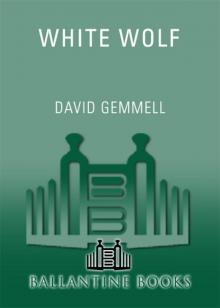 White Wolf
White Wolf Wolf in Shadow
Wolf in Shadow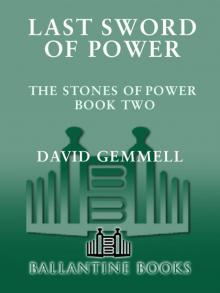 Last Sword of Power
Last Sword of Power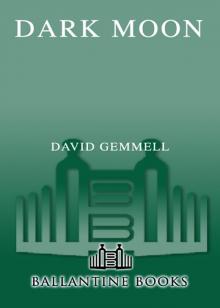 Dark Moon
Dark Moon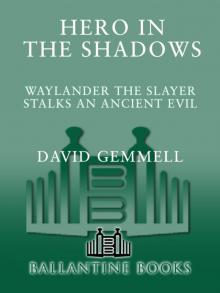 Hero in the Shadows
Hero in the Shadows Gemmell, David - Drenai 09 - Hero In The Shadows
Gemmell, David - Drenai 09 - Hero In The Shadows Waylander
Waylander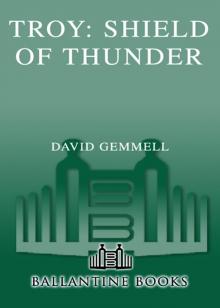 Shield of Thunder
Shield of Thunder Stormrider Stormrider
Stormrider Stormrider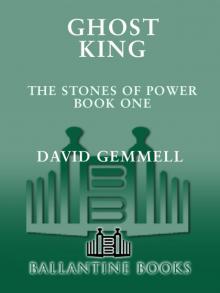 Ghost King
Ghost King Legend
Legend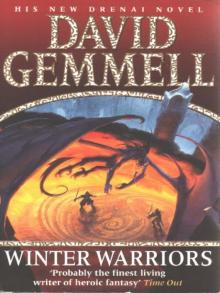 Winter Warriors
Winter Warriors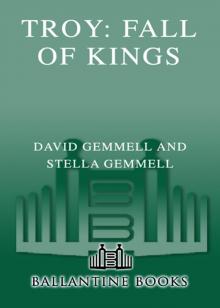 Fall of Kings
Fall of Kings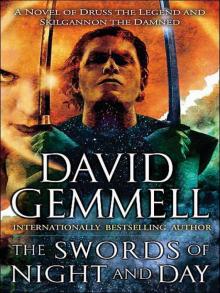 The Swords of Night and Day
The Swords of Night and Day The King Beyond the Gate
The King Beyond the Gate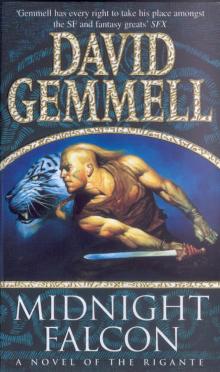 Midnight Falcon
Midnight Falcon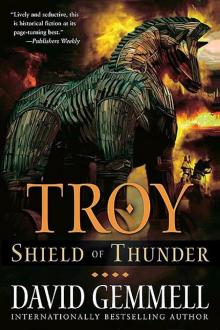 02 - Shield of Thunder
02 - Shield of Thunder In the Realm of the Wolf
In the Realm of the Wolf Ravenheart
Ravenheart The First Chronicles of Druss the Legend
The First Chronicles of Druss the Legend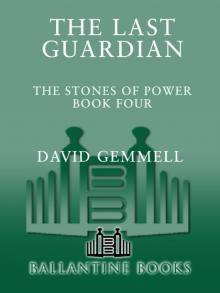 Last Guardian
Last Guardian Stormrider
Stormrider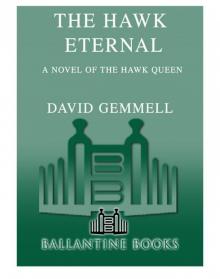 The Hawk Eternal
The Hawk Eternal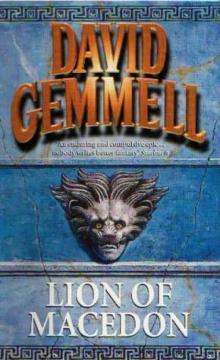 Lion of Macedon
Lion of Macedon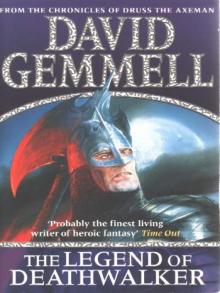 The Legend of Deathwalker
The Legend of Deathwalker Knights of Dark Renown
Knights of Dark Renown Echoes of the Great Song
Echoes of the Great Song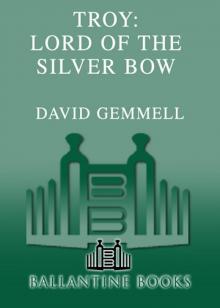 Lord of the Silver Bow
Lord of the Silver Bow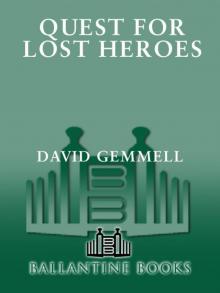 Quest for Lost Heroes
Quest for Lost Heroes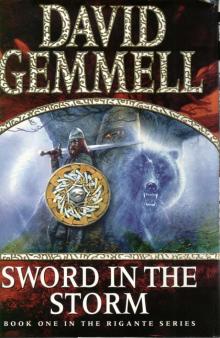 Sword in the Storm
Sword in the Storm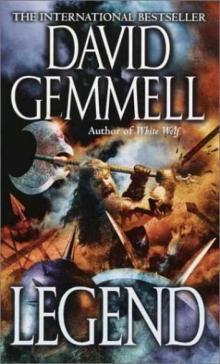 Drenai Saga 01 - Legend
Drenai Saga 01 - Legend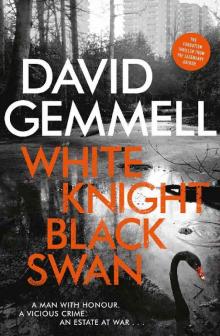 White Knight/Black Swan
White Knight/Black Swan![[Troy 02] - Shield of Thunder Read online](http://i1.bookreadfree.com/i/03/19/troy_02_-_shield_of_thunder_preview.jpg) [Troy 02] - Shield of Thunder
[Troy 02] - Shield of Thunder Lord of the Silver Bow t-1
Lord of the Silver Bow t-1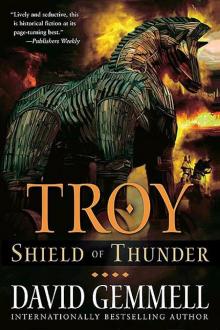 Shield of Thunder t-2
Shield of Thunder t-2 White Wolf: A Novel of Druss the Legend dt-10
White Wolf: A Novel of Druss the Legend dt-10 Drenai Saga 02 - The King Beyond the Gate
Drenai Saga 02 - The King Beyond the Gate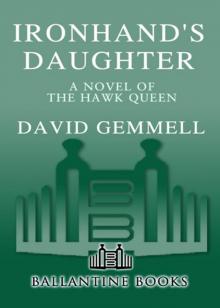 Ironhand's Daughter
Ironhand's Daughter Gemmell, David - Drenai 06 - The First Chronicles of Druss the Legend
Gemmell, David - Drenai 06 - The First Chronicles of Druss the Legend The Last Guardian
The Last Guardian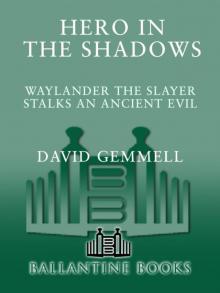 Hero in the Shadows: A Waylander the Slayer Novel
Hero in the Shadows: A Waylander the Slayer Novel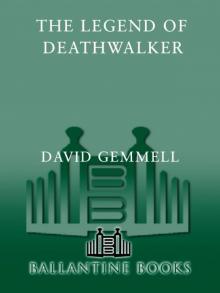 The Legend of the Deathwalker
The Legend of the Deathwalker